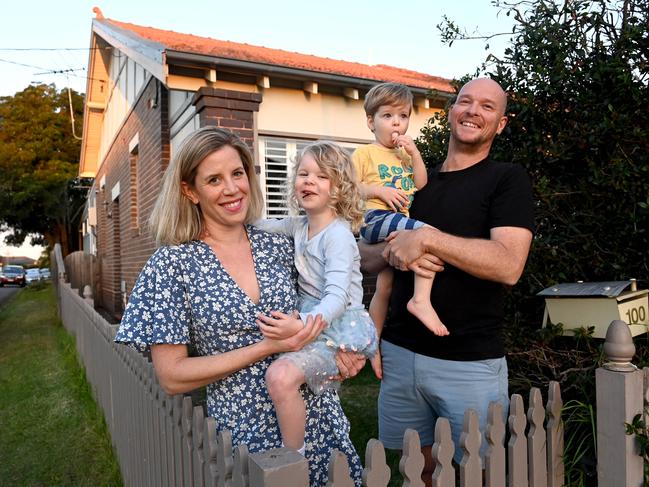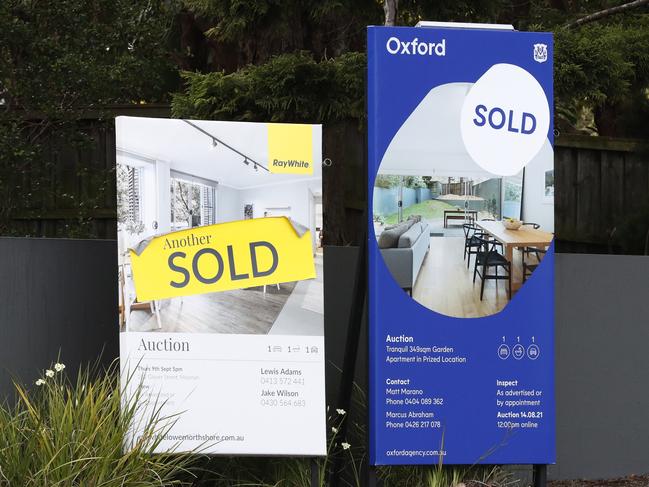Interest rates Australia: RBA rate rises: what is means, best mortgage deals
The era of record low interest rates for homeowners is over, after the RBA lifted the cash rate for the first time in 12 years. This is what it means for you.
Interest Rates
Don't miss out on the headlines from Interest Rates. Followed categories will be added to My News.
The era of record low interest rates for homeowners is over, after the RBA lifted the cash rate for the first time in 12 years, on Tuesday.
The RBA lifted the cash rate from a record low of 0.1 per cent to 0.35 per cent.
Amid inflation concerns and other rises in the cost of living, households are feeling the pinch. This is what the rise in the offical cash rate means for you and where you can get the best mortgage deals.
What does a cash rate rise mean for my mortgage
If you are on a variable rate, your monthly loan repayments will go up.
The amount they go up depends on whether your lender passes on the full increase made by the RBA.
If they do, it’s simply a matter of adding the increase to your existing rate.
For example, if your interest rate is 2.1 per cent and your lender passes on a 15 basis point RBA hike in full, your interest rate will rise to 2.25 per cent.
Finder analysis shows this would bring up repayments on a $600,000 loan over 30 years by $43 a month to $2,293.

It’s worth remembering that lenders often act independently when it comes to interest rate hikes.
Canstar data shows that during the last rate rise in 2010, the average variable rate charged by lenders rose by almost double the RBA’s 0.25 per cent increase.
If you are on a fixed rate, your loan repayments will stay the same until the fixed rate term ends.
What does a cash rate rise mean for house prices?
While an initial hike won’t have a huge impact, it’s likely the RBA will continue to raise rates in a series of increases.
Recent RBA modelling shows that if the cash rate exceeded 2 per cent, property prices could drop nationally by about 15 per cent.
PropTrack economist Cameron Kusher says he expects the cash rate to be about 1 per cent by the end of the year and that any increase to more than 2 per cent would potentially be a slow process that could reduce the risk of prices falling in a major way.
How will a rate hike affect first homebuyers?
It will make the cost of borrowing more expensive, which could affect first home buyers in pricier regions, such as Sydney and Melbourne.
On the other hand, a series of interest rate hikes could take some heat out of the property market – which means it might be easier to negotiate a cheaper purchase price.
Can I still borrow the same amount?
Banks assess a borrower’s capacity to repay their loan by using a serviceability buffer. In other words, they add an extra 3 per cent onto the advertised interest rate to see whether the borrower can afford to make repayments at a higher rate.
If the interest rate goes up, the assessment rate also goes up – meaning you may not be able to borrow as much as you could before.
If you have a pre approval in place, you should speak to your bank or broker to see whether you can still borrow the same amount if rates rise.

What if I’m on a fixed rate?
If you are on a fixed rate when the cash rate goes up, you are immune to any rate rises until the fixed term comes to an end.
But that doesn’t mean you should do nothing.
Lendi Group CEO David Hyman says “a sizeable portion” of fixed rate loans are due to expire this year – meaning borrowers could be hit with high revert rates.
“With fixed rate mortgages rolling over to variable rates many Aussies will have to start considering their refinance options sooner rather than later,” Mr Hyman says.
Should I refinance?
If you are facing higher loan repayments, it might be worth checking what other lenders are charging to see if a better deal is at hand.
A good mortgage broker can discuss your options with you to determine whether a refinance would save you money over the long term or whether fixing would fit your overall financial strategy.
Mortgage Choice broker James Algar said borrowers did not necessarily have to switch banks to save money, as there were thousands of dollars of savings on the table from lenders who did not want to lose existing customers.
“We had a client who was paying 3.19 per cent and wasn’t in a position to refinance. In one phone call we got that down to 2.5 per cent, which will save him at least $10,000 a year,” he said.
RateCity research director Sally Tindall says borrowers should actively prepare for an environment of rising rates.
“Whatever you do, don’t take it lying down,” she says.
“If you’re on a variable rate, and you haven’t refinanced in over two years, or at least picked up the phone and haggled with your bank, then, you know what? You’re probably paying your bank way too much.”
More Coverage
Originally published as Interest rates Australia: RBA rate rises: what is means, best mortgage deals




